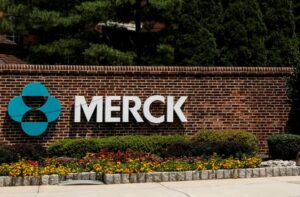(This March 26 story has been corrected to remove reference to follicle-stimulating hormone, in paragraph 8)
By Leroy Leo and Michael Erman
(Reuters) – The U.S. Food and Drug Administration on Tuesday approved Merck’s treatment for adults with high blood pressure due to constriction of lung arteries, adding another potential blockbuster drug to the pharmaceutical giant’s portfolio.
Shares of Merck were up more than 4% in extended trading.
The therapy, branded Winrevair, is approved for treating pulmonary arterial hypertension (PAH), which affects about 40,000 people in the United States.
“We look forward to making a significant difference for these patients that are left with a disease where the five year mortality is 43%,” Jannie Oosthuizen, president of Merck’s U.S. Human Health business, told Reuters.
Winrevair will carry a list price of $14,000 per vial, Oosthuizen said. According to data from the company’s trial, most patients will use a single vial every three weeks, which would translate to $238,000 per year.
The drugmaker expects to be able to bring the drug to the market by the end of April.
Merck received the rights to Winrevair as part of its $11.5 billion acquisition of Acceleron Pharma in 2021. It has been beefing up its portfolio of cardiovascular drugs as part of its strategy to counter a possible hit to sales to its cancer treatment Keytruda, the world’s top selling medicine, from biosimilars later in the decade.
Winrevair, chemically known as sotatercept, becomes the first treatment to secure FDA approval from its class of drugs, which target a type of protein called activin.
PAH is caused by a constriction of arteries in the lungs, leading to high blood pressure and symptoms such as shortness of breath, chest pain and dizziness.
The hypertension also makes the heart work harder to pump blood, eventually causing heart failure.
“We see sotatercept having a strong initial launch and quickly becoming part of the standard of care for eligible PAH patients,” J.P. Morgan analyst Chris Schott wrote in a note.
Schott estimates the therapy to reach peak sales of about $5 billion by 2030.
Approval for Merck’s drug was based on a 24-week long late-stage trial of 323 patients with PAH.
In the trial, patients treated with the drug showed a significant improvement in exercise capacity, increasing their 6 minutes walking distance by 40.8 meters, compared to the placebo.
(Reporting by Leroy Leo, Christy Santhosh and Mariam Sunny in Bengaluru and Michael Erman in New Jersey; Editing by Shinjini Ganguli and Krishna Chandra Eluri)





